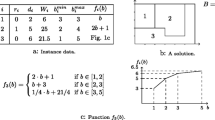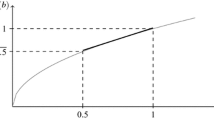Abstract
This paper presents a set of satisfiability tests and time‐bound adjustmentalgorithms that can be applied to cumulative scheduling problems. An instance of thecumulative scheduling problem (CuSP) consists of (1) one resource witha given capacity, and (2) a set of activities, each having a release date, adeadline, a processing time and a resource capacityrequirement. The problem is to decide whether there exists a start time assignment to allactivities such that at no point in time the capacity of the resource is exceeded and alltiming constraints are satisfied. The cumulative scheduling problem can be seen as a relaxationof the decision variant of the resource‐constrained project scheduling problem.We present three necessary conditions for the existence of a feasible schedule. Two ofthem are obtained by polynomial relaxations of the CuSP. The third is based on energeticreasoning. We show that the second condition is closely related to the subset bound, awell‐known lower bound of the m‐machine problem. We also present three algorithms,based on the previously mentioned necessary conditions, to adjust release dates anddeadlines of activities. These algorithms extend the time‐bound adjustment techniquesdeveloped for the one‐machine problem. They have been incorporated in a branch andbound procedure to solve the resource‐constrained project scheduling problem.Computational results are reported.
Similar content being viewed by others
References
R. Alvarez-Valdès and J.M. Tamarit, Heuristic algorithms for resource-constrained project scheduling: A review and an empirical analysis, in: Advances in Project Scheduling, eds. R. Slowinski and J. Weglarz, Elsevier, 1989, chap. 5.
D. Applegate and W. Cook, A computational study of the job-shop scheduling problem, ORSA Journal on Computing 3(1991)149-156.
Ph. Baptiste and C. Le Pape, A theoretical and experimental comparison of constraint propagation techniques for disjunctive scheduling, Proceedings of the 14th International Joint Conference on Artificial Intelligence, 1995.
Ph. Baptiste and C. Le Pape, Constraint propagation and decomposition techniques for highly disjunctive and highly cumulative project scheduling problems, Proceedings of the 3rd International Conference on Principles and Practice of Constraint Programming, 1997.
Ph. Baptiste, C. Le Pape and W.P.M. Nuijten, Satisfiability tests and time-bound adjustments for cumulative scheduling problems, Technical Report 98/97, Université de Technologie de Compiègne, 1998.
P. Brucker and O. Thiele, A branch and bound method for the general-shop problem with sequence-dependent setup times, OR Spektrum 18(1996)145-161.
P. Brucker, S. Knust, A. Schoo and O. Thiele, A branch and bound algorithm for the resource-constrained project scheduling problem, Working Paper, University of Osnabrück, 1997.
J. Carlier, Problèmes d'ordonnancement à contraintes de ressources: algorithmes et complexité, Thèse de Doctorat d'Etat, Université Paris VI, 1984.
J. Carlier and E. Pinson, A practical use of Jackson's preemptive schedule for solving the job-shop problem, Annals of Operations Research 26(1990)269-287.
J. Carlier and E. Pinson, Adjustment of heads and tails for the job-shop problem, European Journal of Operational Research 78(1994)146-161.
J. Carlier and E. Pinson, Jackson's pseudo-preemptive schedule for the P m /r i , q i/Cmax scheduling problem, Technical Report 96/01, Université de Technologie de Compiègne, 1996.
Y. Caseau and F. Laburthe, Improved CLP scheduling with task intervals, Proceedings of the 11th International Conference on Logic Programming, 1994.
Y. Caseau and F. Laburthe, Cumulative scheduling with task intervals, Proceedings of the Joint International Conference and Symposium on Logic Programming, 1996.
Y. Caseau and F. Laburthe, CLAIRE: A parametric tool to generate C++ code for problem solving, Working Paper, Bouygues, Direction Scientifique, 1996.
E. Demeulemeester and W. Herroelen, A branch-and-bound procedure for the multiple resource-constrained project scheduling problem, Management Science 38(1992)1803-1818.
E. Demeulemeester and W. Herroelen, New benchmark results for the resource-constrained project scheduling problem, Technical Report, Katholieke Universiteit Leuven, 1995.
J. Erschler, P. Lopez and C. Thuriot, Raisonnement temporel sous contraintes de ressource et problèmes d'ordonnancement, Revue d'Intelligence Artificielle 5(1991)7-32.
A. Federgruen and H. Groenevelt, Preemptive scheduling of uniform machines by ordinary network flow techniques, Management Science 32(1986)341-349.
M.R. Garey and D.S. Johnson, Computers and Intractability. A Guide to the Theory of NP-Completeness, W.H. Freeman, 1979.
M. Gondran and M. Minoux, Graphs and Algorithms, Wiley, 1984.
R. Kolisch, A. Sprecher and A. Drexl, Characterization and generation of a general class of resource-constrained project scheduling problems, Management Science 41(1995)1693-1703.
C. Le Pape and Ph. Baptiste, Constraint propagation techniques for disjunctive scheduling: The preemptive case, Proceedings of the 12th European Conference on Artificial Intelligence, 1996.
P. Lopez, J. Erschler and P. Esquirol, Ordonnancement de tâches sous contraintes: une approche énergétique, RAIRO Automatique, Productique, Informatique Industrielle 26(1992)453-481.
P. Martin and D.B. Shmoys, A new approach to computing optimal schedules for the job-shop scheduling problem, Proceedings of the 5th Conference on Integer Programming and Combinatorial Optimization, 1996.
W.P.M. Nuijten, Time and resource constrained scheduling: A constraint satisfaction approach, Ph.D. Thesis, Eindhoven University of Technology, 1994.
W.P.M. Nuijten and E.H.L. Aarts, A computational study of constraint satisfaction for multiple capacitated job-shop scheduling, European Journal of Operational Research 90(1996)269-284.
J.H. Patterson, A comparison of exact approaches for solving the multiple constrained resource project scheduling problem, Management Science 30(1984)854-867.
M. Perregaard, Branch and bound methods for the multi-processor job-shop and flow-shop scheduling problem, M.Sc. Thesis, University of Copenhagen, 1995.
E. Pinson, Le problème de job-shop, Ph.D. Thesis, Université Paris VI, 1988.
Rights and permissions
About this article
Cite this article
Baptiste, P., Le Pape, C. & Nuijten, W. Satisfiability tests and time‐bound adjustmentsfor cumulative scheduling problems. Annals of Operations Research 92, 305–333 (1999). https://doi.org/10.1023/A:1018995000688
Issue Date:
DOI: https://doi.org/10.1023/A:1018995000688




